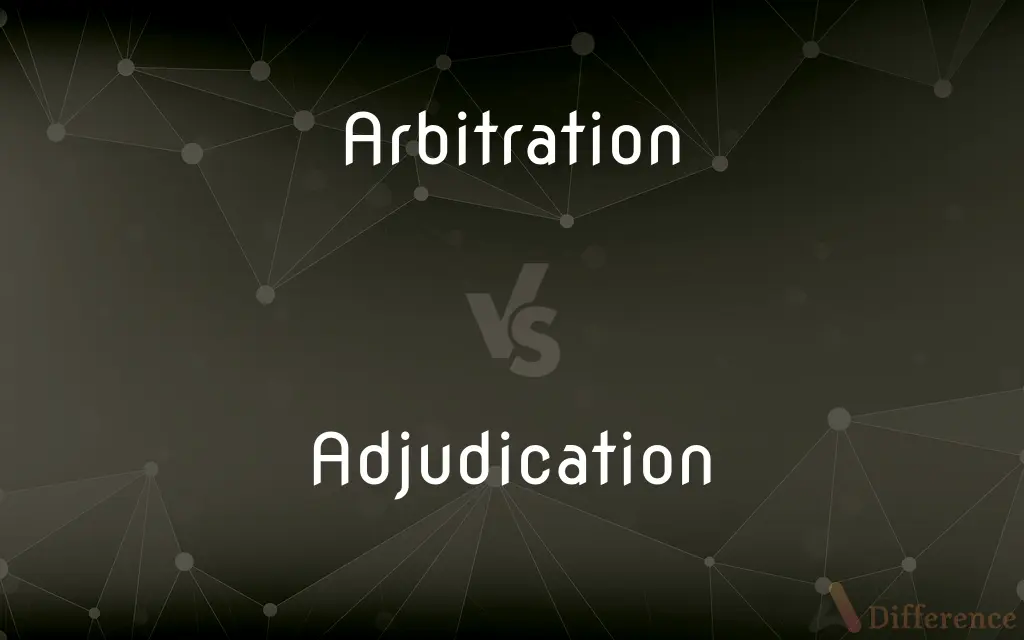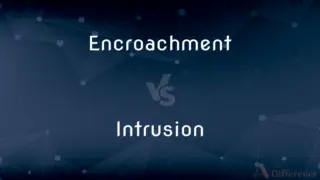Arbitration vs. Adjudication — What's the Difference?
By Fiza Rafique & Maham Liaqat — Updated on March 19, 2024
Arbitration is a private dispute resolution process, while adjudication involves a public, formal court system.

Difference Between Arbitration and Adjudication
Table of Contents
ADVERTISEMENT
Key Differences
Arbitration is a method of dispute resolution where parties opt for a private process, often chosen for its confidentiality and flexibility. On the other hand, adjudication refers to the process where a dispute is resolved within the formal court system by a judge or a jury.
Arbitration tends to be faster and can be less expensive than adjudication due to its streamlined nature. Whereas, adjudication can be more costly and time-consuming, largely because of its formalities, the potential for appeals, and the often-lengthy court schedules.
One key difference is that arbitration proceedings are private and the details of the case and its outcome are not made public. On the other hand, adjudication is a public process, with proceedings and outcomes becoming part of the public record.
In arbitration, the parties have more control over the process, including the ability to customize the rules of the proceeding and choose their arbitrator. Conversely, adjudication follows a standard legal process governed by laws and procedures that are not customizable.
Comparison Chart
Nature
Private dispute resolution
Public court process
ADVERTISEMENT
Flexibility
More flexible, parties choose arbitrators
Less flexible, follows legal procedures
Cost
Generally less expensive
Can be more expensive due to legal fees and time
Time
Typically faster to reach a resolution
Can be time-consuming due to court schedules
Confidentiality
Proceedings and outcomes are confidential
Proceedings and outcomes are public
Legal Framework
Less formal, parties have control over the process
Formal, governed by statutory and procedural laws
Expertise
Arbitrators can be chosen for their specific expertise
Judges are not chosen for their expertise in a particular field
Appealability
Decisions are usually final and binding with limited appeals
Decisions can be appealed in higher courts
Outcome Transparency
Details and outcomes generally not disclosed to the public
Outcomes and details are part of the public record
Compare with Definitions
Arbitration
A method of resolving disputes outside the courtroom, involving a neutral third party.
The two companies opted for arbitration to settle their contract dispute quietly.
Adjudication
Unsatisfied with the verdict, they decided to appeal the adjudication decision.
Does not allow parties to choose the judge or the legal procedures to be followed.
Arbitration
Decisions made in arbitration are generally binding and have limited avenues for appeal.
Once the arbitration decision was made, it was final, with no option for appeal.
Adjudication
The contract dispute went to adjudication, where it was heard by a judge.
Public in nature, with proceedings and outcomes becoming part of the public record.
Arbitration
Allows parties to choose their arbitrator(s), often experts in the field relevant to the dispute.
For their technology dispute, they selected an arbitrator well-versed in tech law.
Adjudication
Due to the adjudication, the details of their dispute became publicly accessible.
Follows formal legal procedures and is governed by statutory and case law.
Arbitration
Often stipulated as the preferred method of dispute resolution in contracts.
Their agreement included an arbitration clause, mandating arbitration in case of disputes.
Adjudication
The adjudication process was thorough, adhering to strict legal protocols.
Allows for the possibility of appeals to higher courts, extending the resolution timeline.
Arbitration
Characterized by its confidentiality and speed compared to traditional court cases.
They preferred arbitration for its ability to resolve issues quickly and privately.
Adjudication
In their adjudication, the judge was assigned, and the legal framework was predetermined.
Arbitration
Arbitration, a form of alternative dispute resolution (ADR), is a way to resolve disputes outside the judiciary courts. The dispute will be decided by one or more persons (the 'arbitrators', 'arbiters' or 'arbitral tribunal'), which renders the 'arbitration award'.
Adjudication
Adjudication is the legal process by which an arbiter or judge reviews evidence and argumentation, including legal reasoning set forth by opposing parties or litigants, to come to a decision which determines rights and obligations between the parties involved.Adjudication can also refer to the processes at dance competitions, in television game shows and at other competitive forums, by which competitors are evaluated and ranked and a winner is found.
Arbitration
The use of an arbitrator to settle a dispute
Tayside Regional Council called for arbitration to settle the dispute
Binding arbitration
Adjudication
To make a decision (in a legal case or proceeding), as where a judge or arbitrator rules on some disputed issue or claim between the parties.
Arbitration
The process by which the parties to a dispute submit their differences to the judgment of an impartial person or group appointed by mutual consent or statutory provision.
Adjudication
To study and settle (a dispute or conflict)
The principal adjudicated the students' quarrel.
Arbitration
The act or process of arbitrating.
Adjudication
To act as a judge of (a contest or an aspect of a contest).
Arbitration
A process through which two or more parties use an arbitrator or arbiter in order to resolve a dispute.
Adjudication
To make a decision in a legal case or proceeding
A judge adjudicating on land claims.
Arbitration
In general, a form of justice where both parties designate a person whose ruling they will accept formally. More specifically in Market Anarchist (market anarchy) theory, arbitration designates the process by which two agencies pre-negotiate a set of common rules in anticipation of cases where a customer from each agency is involved in a dispute.
Adjudication
To study and settle a dispute or conflict.
Arbitration
The hearing and determination of a cause between parties in controversy, by a person or persons chosen by the parties.
Adjudication
To act as a judge of a contest.
Arbitration
(law) the hearing and determination of a dispute by an impartial referee agreed to by both parties (often used to settle disputes between labor and management)
Adjudication
The act of adjudicating, of reaching a judgement.
Arbitration
The act of deciding as an arbiter; giving authoritative judgment;
They submitted their disagreement to arbitration
Adjudication
A judgment or sentence.
Adjudication
(legal) The decision upon the question of whether the debtor is a bankrupt.
Adjudication
(emergency response) The process of identifying the type of material or device that set off an alarm and assessing the potential threat with corresponding implications for the need to take further action.
Adjudication
A process by which land is attached as security or in satisfaction of a debt.
Adjudication
The act of adjudicating; the act or process of trying and determining judicially.
Adjudication
A deliberate determination by the judicial power; a judicial decision or sentence.
Adjudication
The decision upon the question whether the debtor is a bankrupt.
Adjudication
A process by which land is attached security or in satisfaction of a debt.
Adjudication
The final judgment in a legal proceeding; the act of pronouncing judgment based on the evidence presented
Adjudication
The legal process of resolving a dispute through the court system, involving a judge or jury.
Common Curiosities
What is arbitration?
Arbitration is a private method of dispute resolution involving a neutral third party to make a decision.
What is adjudication?
Adjudication is the formal process of resolving disputes within the court system, involving a judge or jury.
Is adjudication more expensive than arbitration?
Yes, adjudication can be more costly and time-consuming due to its formalities and potential for appeals.
Can decisions in arbitration be appealed?
Arbitration decisions are generally final with limited opportunities for appeal.
What role does a jury play in adjudication?
A jury, when involved, decides on the facts of the case in a trial, under the guidance of a judge.
How does arbitration differ from adjudication in terms of privacy?
Arbitration is private with confidential outcomes, while adjudication is public, making outcomes part of the public record.
Can arbitration decisions be enforced legally?
Yes, arbitration decisions are legally binding and enforceable in courts.
Why might someone choose arbitration over adjudication?
For its speed, confidentiality, and the ability to select an arbitrator with specific expertise.
Are arbitration proceedings public?
No, arbitration proceedings are private and confidential.
How does arbitration ensure expertise in the decision-making process?
Parties can select arbitrators who have specific expertise relevant to their dispute.
Why might arbitration be considered less formal than adjudication?
Because it allows for more flexibility in procedures and does not follow the strict rules of court.
Can parties choose their judge in adjudication?
No, parties cannot choose their judge in adjudication; judges are assigned based on the legal system.
What makes arbitration appealing to businesses?
Its confidentiality, speed, and the control it offers over the selection of arbitrators.
What is the significance of a public record in adjudication?
It ensures transparency and allows for legal precedents to be established.
Share Your Discovery

Previous Comparison
Swamp vs. Bog
Next Comparison
Encroachment vs. IntrusionAuthor Spotlight
Written by
Fiza RafiqueFiza Rafique is a skilled content writer at AskDifference.com, where she meticulously refines and enhances written pieces. Drawing from her vast editorial expertise, Fiza ensures clarity, accuracy, and precision in every article. Passionate about language, she continually seeks to elevate the quality of content for readers worldwide.
Co-written by
Maham Liaqat














































